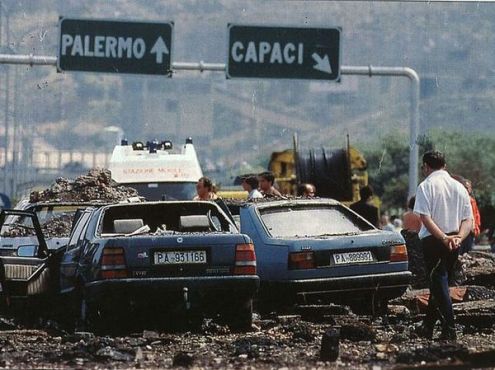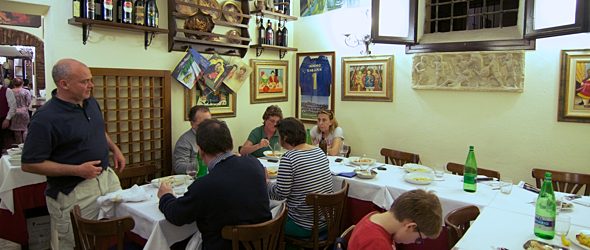Forty years ago a young lady, all of eighteen years of age, boarded a train in Trento in the north of Italy heading for Trapani in Sicily, deep in Italy’s south. From Rome onwards this young lady was in tears. She did not feel as if she was in the same country.
When the young lady in question got to the railway station in Trento and asked for a ticket to Trapani she was greeted with a double-take by the person in the ticket office. ‘Trapani?!’, repeated the ticket seller, several times, in disbelief. The young lady confirmed her destination, several times, and eventually persuaded the ticket seller to let her buy a ticket to Sicily. Why such an odd reaction? Italy’s north south divide.
Forty years ago, which is not really that long ago, many northern Italians detested those from Italy’s south, and found it incredible that anyone from the north of Italy should actually want to go there. Hence the reaction of the ticket seller, which, from what I’ve been told, was nothing unusual at that time.
On the eve of the 2011 celebrations of 150 years of unity in Italy, at lunch on Saturday, I learnt that only 40 years ago, that’s around 1970, Italy was still far from being united.
Few people realise that Italy is an exceedingly young country. In actual fact, Italy is much, much younger than its official age of 150 years, and Italians are still not showing too many signs of wanting to become part of one big happy Italian family, either. Quite the opposite.
But why the tears?
Tears from Trento to Trapani
This young woman was off to see her boyfriend down in Trapani in Sicily – a twenty-four hour rail trip from Trento in those days. As if the length of the journey were not daunting enough, from Rome onwards, as the train headed progressively further south, this young lady found she could make neither head nor tail of what her fellow countrymen were saying. It was as if she were in another country, which, to all intents and purposes, she was. She cried because she felt alone and isolated – in her own country.
Italian Not Widespread in the 70s
Up in Trento at that time – the 1970s – Italians, including our young lady friend, were still speaking their local dialect in preference to Italian. Now, while some Italian dialects are close to modern Italian, others are literally different languages. Some Italians just did not speak Italian. Still today, though nieces and nephews speak Italian to their grandparents, they will reply in their local dialect. Some of the older generations in Italy still refuse to speak Italian. Such is united Italy.
Amazement
It was amazing, for me anyway, to hear that a mere 40 years ago, 110 years after Italy’s ‘unification’, its citizens were unable to communicate using a common language. It was almost as if Italy were still a collection of mini-countries within a country. The term ‘Italy’ was (is?) not much more than a means of identifying the country on a map, and that was about it.

Stop reading, start speaking
Stop translating in your head and start speaking Italian for real with the only audio course that prompt you to speak.
I had already come across the curious phenomena of Italians not knowing much about their own country. By way of an example, I remember telling an Italian friend of mine from Genoa about cassoeula, a traditional Milan dish – which my friend had never heard of. Genoa is around 150 kilometres from Milan – that’s less than two hours by train or car, but it was as if Genoa were on the other side of the world, such was the lack of knowledge of Milan. Try asking someone from Milan what ‘Cima’ is, and see if they know – many will not.
The lack of knowledge on the part of my Genoa friend surprised me, and I’m talking about Italy now, not forty, nor one hundred and fifty years ago.
And Today?

Has the situation the young lady train traveller experienced changed today, forty years on? Yes, but only partially.
North-south antagonism is still as strong as ever in Italy, as is evidenced by the existence of the separatist Lega Nord political party, which would love Italy to be split into two. Indeed, something called ‘fiscal federalism’ is about to formally divide Italy. This ‘fiscal’ form of federalism is a watered down version of total federalism, which is what the Lega Nord people were angling for. And the Italian concept of federalism is nothing like the federal system in the USA. Oh, no. Some Italians really do not want to be Italian.
One wonders what Italy’s politicians have been doing for all these years. Surely they should have been working towards making Italy one united country? About the only Italian who made any real effort towards this was Mussolini – and he ended up being shot and hung upside down by his own people. Yes, I know he was a dictator who did highly questionable things, but not everything he did was bad, and attempting to unite Italy was probably one of his better goals. He failed, but few of Italy’s politicians post-Mussolini seem to have worked towards the creation of a united Italy.
In today’s Italy, the government contains more than a few ministers who are members of the anti-unity Lega Nord. For example, Italy’s finance minister Tremonti is a northerner. These ministers do not promote Italian unity, and have no interest in doing so. It could be argued that they are united in their desire to ensure Italy is never fully united.
Disunity over 150th Anniversary Celebrations
Such is the feeling, or lack of, of unity in Italy that the celebration of 150 years of Italian unity due next year has been marred by polemics. Here’s one example, in Italian, from the site Ospitaletto, dated 13 August 2010: Polemiche sui festeggiamenti per i 150 anni dell’Italia – Polemics over the celebration of 150 years of Italian unity. This is but one example of many, as quick search via Google, etc, will reveal. Even Italy’s President Napolitano has attempted to silence all the bickering by stating that celebrations planned for March 17, 2011 are not a waste of time.
I wonder if there are girls today travelling from north to south in Italy who end up in tears?
Incidentally, the mafia became a national organisation around 150 years ago, and Italy’s south started to go downhill. Coincidence? Not necessarily.





